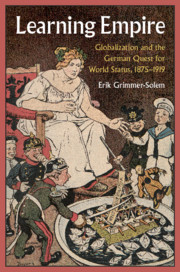Book contents
- Learning Empire
- Learning Empire
- Copyright page
- Contents
- Illustrations
- Acknowledgments
- Abbreviations
- Introduction
- Part I Absent-Minded Empire, 1875–1897
- Part II Empire Imagined, 1897–1907
- Part III Empire Lost, 1908–1919
- 9 Colonial Dreams
- 10 World Policy Contained
- 11 From World Policy to World War
- 12 War Aims, Peace Resolutions, and Defeat
- Epilogue
- Selected Bibliography
- Index
12 - War Aims, Peace Resolutions, and Defeat
from Part III - Empire Lost, 1908–1919
Published online by Cambridge University Press: 20 September 2019
- Learning Empire
- Learning Empire
- Copyright page
- Contents
- Illustrations
- Acknowledgments
- Abbreviations
- Introduction
- Part I Absent-Minded Empire, 1875–1897
- Part II Empire Imagined, 1897–1907
- Part III Empire Lost, 1908–1919
- 9 Colonial Dreams
- 10 World Policy Contained
- 11 From World Policy to World War
- 12 War Aims, Peace Resolutions, and Defeat
- Epilogue
- Selected Bibliography
- Index
Summary
The civil truce between parties and religious confessions proclaimed by the Kaiser in August 1914 was severely eroded by the controversy over war aims that Karl Rathgen, Hermann Schumacher, and Max Sering played key roles in defining. Set in the context of the preceding chapters, annexationist war aims must be seen as a continuation of “World Policy” with liberal imperialist features. Meanwhile, Gustav Schmoller became embroiled in a public controversy sparked by the army’s “Jewish census,” lending anti-Semitic prejudice credibility and further eroding the civil truce. War aims would prove highly controversial, and along with the debate over the resumption of unrestricted submarine warfare, fueled the anti-government and anti-Kaiser populism that culminated in the formation of the Fatherland Party and the final gamble to secure a victory with annexations and war indemnities. After Germany’s defeat the war aims debate, the Jewish census, and the Fatherland Party would cast a long shadow. Along with the inherent contradictions of the Paris Peace, they turned a sizeable portion of the German public into intractable foes of their republic and the new world order.
Keywords
- Type
- Chapter
- Information
- Learning EmpireGlobalization and the German Quest for World Status, 1875–1919, pp. 541 - 599Publisher: Cambridge University PressPrint publication year: 2019

